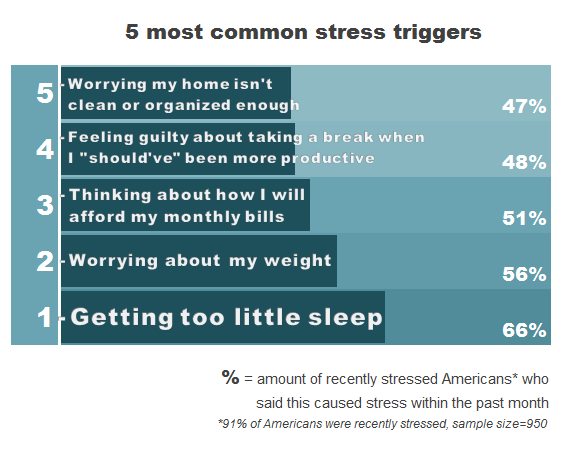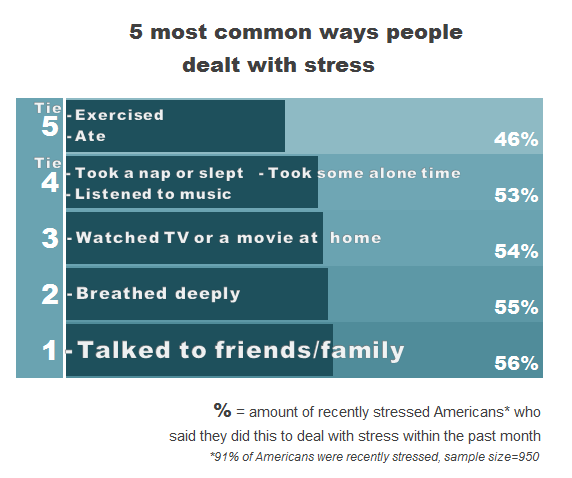
Americans are stressed.
Ninety-one percent of us felt stressed by something in the month of March, with 77 percent of us feeling stressed “regularly” -- defined as weekly or more. Men and women reported being stressed equally as often, though that stress can be triggered by somewhat different things.
Those are among the results of a national survey of more than a thousand Americans 18 and older, conducted online for the Huffington Post by an internal research team. It is to be an ongoing project, with different facets of the research being highlighted in relevant sections of the Huffington Post in the coming weeks, and follow-up questions planned to dig further into some of the most interesting findings.
This first piece explored specific triggers that cause us stress and how we currently deal with stressful moments. People taking the survey told us their stories in their own words and also answered specific questions. The resulting data paint a portrait of an adult population that feels burdened and pressured -- and it spotlights ways to potentially reduce the stress.
When people were asked about the biggest cause of their most recent stress, the most common answers tended to include all the things you might expect: too much work (or none at all), too little time, financial concerns, illness and rocky relationships. More than half of those surveyed named “Work” (or lack thereof) as their biggest stressor, and full-time employees were more likely to bring this up than Americans in general (75 percent did so). Many answers relating to work stress spoke to the overwhelming pressure people face to do more than ever, in less time, for the same amount of money or less.
In describing their stressors, people said things like “Over-worked and under-appreciated,” “The feeling that I’m not doing well enough,” “Makes me feel that I can not do enough in the hours I have, and that my bills may never be paid” and “I feel like I can’t keep up.”
In addition to having “too much” to do, another phrase that came up often was “not enough.” The feeling of missing something essential was pervasive, and nearly one in four responses included the word “not” in some form (i.e., don’t, can’t, won’t). While some lack essentials today, others worry about having them tomorrow -- specifically, these include time, money, health and/or employment. We are perhaps more united than we realize in our constant striving to attain “enough” of these limited resources. It all seems to beg the question of when do we have enough? Will we recognize it when we see it, or raise the bar and aim for more?
When it comes to how stress makes us feel, those who’d recently been stressed were most likely to describe it as “pressure,” which can makes them feel “overwhelmed,” “inadequate,” “frustrated,” “exhausted” and “anxious.” Many who started the sentence “It makes me feel” completed it with other obvious negatives such as “bad,” “panicky,” and “like I should have done more” or “like I’ll never get everything done.”
However, when respondents were asked specifically whether or not a wide range of things had caused them stress in the past month, the most common answer was “getting too little sleep,” which is, arguably, one stressor that individuals can actually do something about. (And it was one of the few things we looked at that has a relatively universally agreed upon range of what “enough” means.)

Among the 91 percent who felt stressed by something in March, only 5 percent felt that lack of sleep didn’t apply to them at all, while 66 percent said this did cause them stress. The other 29 percent may have gotten too little sleep but didn’t feel it caused them stress. While the majority of both genders faced this issue, women were 24 percent more likely to be stressed by getting too little sleep than men.
In order to understand how we can collectively get “enough” sleep, we wanted to first explore what was getting in the way of it, so we asked respondents to elaborate on their habits. Americans are not sleeping enough for many reasons, they told researchers. We are dealing with schedules that keep us up too late and get us up too early, the result of work, school or household responsibilities (“too much to do and too little time,” as one respondent said). Sleep can become the most negotiable item on the to-do list.
Once in bed, respondents described difficulty in “turning off” the brain -- so the stress of the day can lead to insomnia, which can lead to more stress the next day caused by lack of sleep. This effect was particularly bad for one individual who explained, “I am on medication which can cause insomnia so I’ve been worried about not being able to sleep and have thought about what I’ll do during the day to catch up on my sleep if I’m unable to sleep.”
The results of lack of sleep include more stress -- acting as a stress magnifier. “I was tired the next day and unable to deal with things, a little more cranky,” one person wrote. Said another: “My general level of stress and irritability is caused by too little sleep every night,” another said.
When people were asked whether they had done a number of specific things to deal with their stress in the past month, the most common answers were “Talk to a friend or family member” (56 percent), “Breathe deeply” (55 percent), “Watch TV or a movie at home” (54 percent) and “Take a nap or go to sleep” (53 percent).

The good news is stress, respondents say, is not the only strain of emotions they feel regularly. While 77 percent of Americans felt stressed regularly in the past month, more reported feeling “Happy” (91 percent) and “Grateful” (89 percent) on a weekly or daily basis.
How these all exist together in an American working day -- how we compartmentalize them, or not, whether we use happiness and gratitude to tamp down worry and stress -- are questions to explore going forward. HuffPost invites readers to use the comments to explore their personal coping equations and to suggest questions we might ask in future surveys.
Also on HuffPost:
